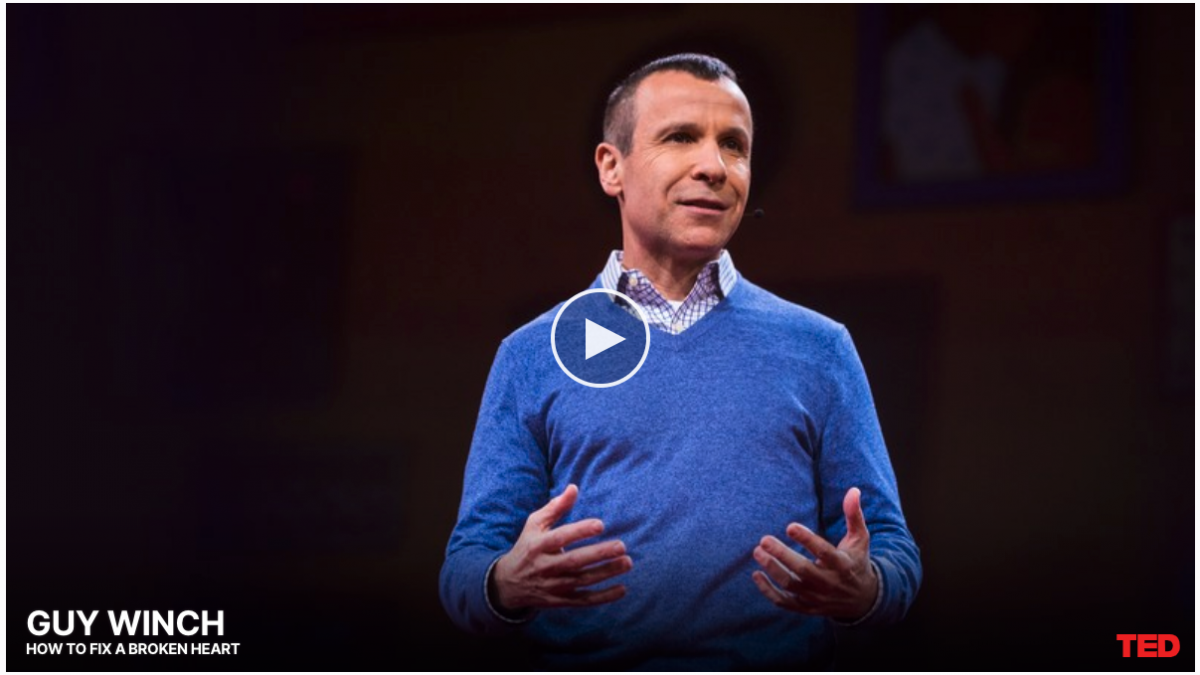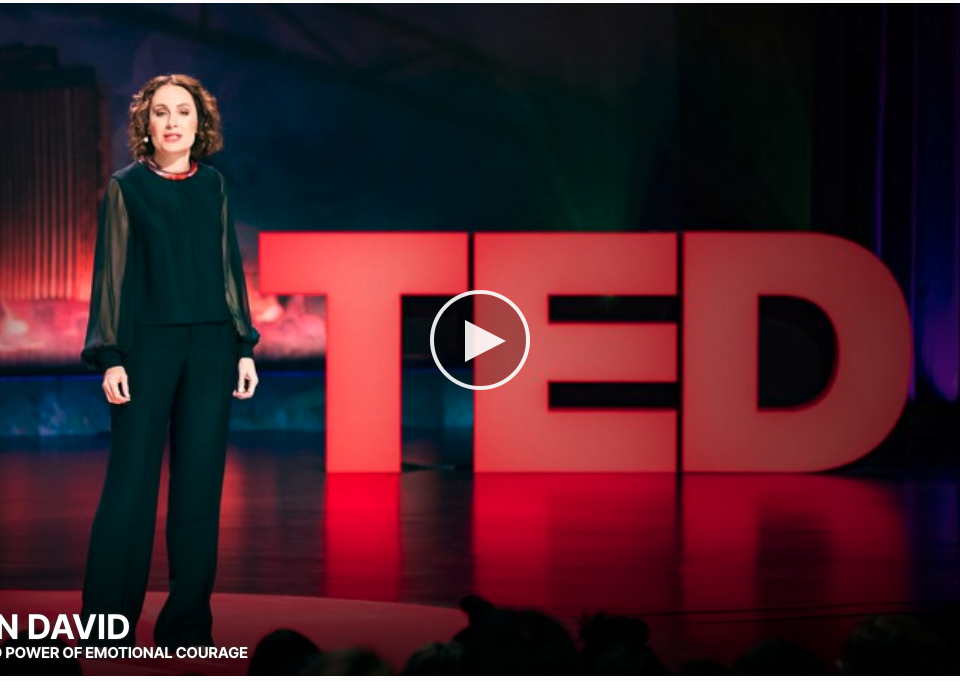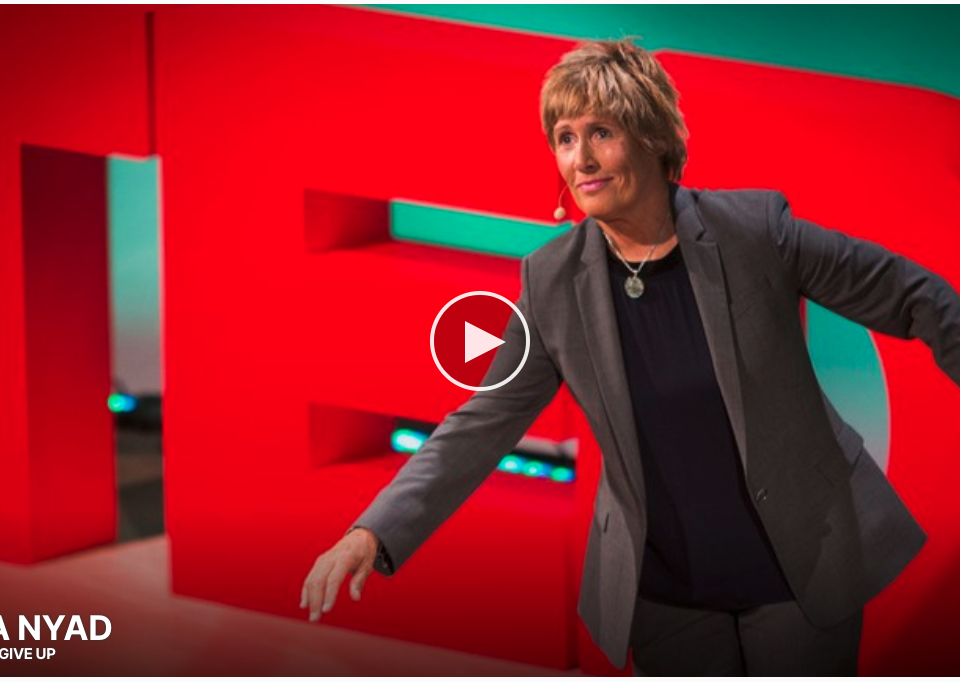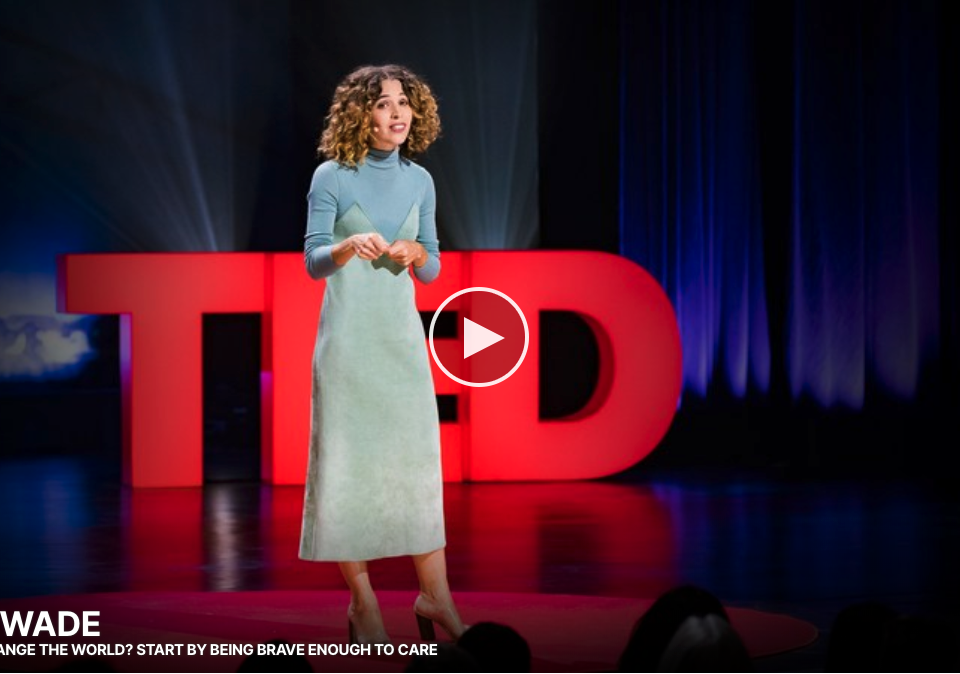
How do you say… in English?
25 de março de 2020
World faces biggest humanitarian crisis since 1945
30 de março de 2020At some point in our lives, almost every one of us will have our heart broken.
My patient Kathy planned her wedding when she was in middle school. She would meet her future husband by age 27, get engaged a year later and get married a year after that. But when Kathy turned 27, she didn’t find a husband. She found a lump in her breast. She went through many months of harsh chemotherapy and painful surgeries, and then just as she was ready to jump back into the dating world, she found a lump in her other breast and had to do it all over again. Kathy recovered, though, and she was eager to resume her search for a husband as soon as her eyebrows grew back in. When you’re going on first dates in New York City, you need to be able to express a wide range of emotions.
(Laughter)
Soon afterwards, she met Rich and fell in love. The relationship was everything she hoped it would be. Six months later, after a lovely weekend in New England, Rich made reservations at their favorite romantic restaurant. Kathy knew he was going to propose, and she could barely contain her excitement.
But Rich did not propose to Kathy that night. He broke up with her. As deeply as he cared for Kathy — and he did — he simply wasn’t in love.
Kathy was shattered. Her heart was truly broken, and she now faced yet another recovery. But five months after the breakup, Kathy still couldn’t stop thinking about Rich. Her heart was still very much broken. The question is: Why? Why was this incredibly strong and determined woman unable to marshal the same emotional resources that got her through four years of cancer treatments? Why do so many of us flounder when we’re trying to recover from heartbreak? Why do the same coping mechanisms that get us through all kinds of life challenges fail us so miserably when our heart gets broken?
In over 20 years of private practice, I have seen people of every age and background face every manner of heartbreak, and what I’ve learned is this: when your heart is broken, the same instincts you ordinarily rely on will time and again lead you down the wrong path. You simply cannot trust what your mind is telling you.
For example, we know from studies of heartbroken people that having a clear understanding of why the relationship ended is really important for our ability to move on. Yet time and again, when we are offered a simple and honest explanation like the one Rich offered Kathy, we reject it. Heartbreak creates such dramatic emotional pain, our mind tells us the cause must be equally dramatic. And that gut instinct is so powerful, it can make even the most reasonable and measured of us come up with mysteries and conspiracy theories where none exist. Kathy became convinced something must have happened during her romantic getaway with Rich that soured him on the relationship, and she became obsessed with figuring out what that was. And so she spent countless hours going through every minute of that weekend in her mind, searching her memory for clues that were not there. Kathy’s mind tricked her into initiating this wild goose chase. But what compelled her to commit to it for so many months?
Heartbreak is far more insidious than we realize. There is a reason we keep going down one rabbit hole after another, even when we know it’s going to make us feel worse. Brain studies have shown that the withdrawal of romantic love activates the same mechanisms in our brain that get activated when addicts are withdrawing from substances like cocaine or opioids. Kathy was going through withdrawal. And since she could not have the heroin of actually being with Rich, her unconscious mind chose the methadone of her memories with him. Her instincts told her she was trying to solve a mystery, but what she was actually doing was getting her fix. This is what makes heartbreak so difficult to heal. Addicts know they’re addicted. They know when they’re shooting up. But heartbroken people do not. But you do now. And if your heart is broken, you cannot ignore that. You have to recognize that, as compelling as the urge is, with every trip down memory lane, every text you send, every second you spend stalking your ex on social media, you are just feeding your addiction, deepening your emotional pain and complicating your recovery.
Getting over heartbreak is not a journey. It’s a fight, and your reason is your strongest weapon. There is no breakup explanation that’s going to feel satisfying. No rationale can take away the pain you feel. So don’t search for one, don’t wait for one, just accept the one you were offered or make up one yourself and then put the question to rest, because you need that closure to resist the addiction. And you need something else as well: you have to be willing to let go, to accept that it’s over. Otherwise, your mind will feed on your hope and set you back. Hope can be incredibly destructive when your heart is broken.
Heartbreak is a master manipulator. The ease with which it gets our mind to do the absolute opposite of what we need in order to recover is remarkable. One of the most common tendencies we have when our heart is broken is to idealize the person who broke it. We spend hours remembering their smile, how great they made us feel, that time we hiked up the mountain and made love under the stars. All that does is make our loss feel more painful. We know that. Yet we still allow our mind to cycle through one greatest hit after another, like we were being held hostage by our own passive-aggressive Spotify playlist.
(Laughter)
Heartbreak will make those thoughts pop into your mind. And so to avoid idealizing, you have to balance them out by remembering their frown, not just their smile, how bad they made you feel, the fact that after the lovemaking, you got lost coming down the mountain, argued like crazy and didn’t speak for two days. What I tell my patients is to compile an exhaustive list of all the ways the person was wrong for you, all the bad qualities, all the pet peeves, and then keep it on your phone.
(Laughter)
And once you have your list, you have to use it. When I hear even a hint of idealizing or the faintest whiff of nostalgia in a session, I go, “Phone, please.”
(Laughter)
Your mind will try to tell you they were perfect. But they were not, and neither was the relationship. And if you want to get over them, you have to remind yourself of that, frequently.
None of us is immune to heartbreak. My patient Miguel was a 56-year-old senior executive in a software company. Five years after his wife died, he finally felt ready to start dating again. He soon met Sharon, and a whirlwind romance ensued. They introduced each other to their adult children after one month, and they moved in together after two. When middle-aged people date, they don’t mess around. It’s like “Love, Actually” meets “The Fast and the Furious.”
(Laughter)
Miguel was happier than he had been in years. But the night before their first anniversary, Sharon left him. She had decided to move to the West Coast to be closer to her children, and she didn’t want a long-distance relationship. Miguel was totally blindsided and utterly devastated. He barely functioned at work for many, many months, and he almost lost his job as a result. Another consequence of heartbreak is that feeling alone and in pain can significantly impair our intellectual functioning, especially when performing complex tasks involving logic and reasoning. It temporarily lowers our IQ.
But it wasn’t just the intensity of Miguel’s grief that confused his employers; it was the duration. Miguel was confused by this as well and really quite embarrassed by it. “What’s wrong with me?” he asked me in our session. “What adult spends almost a year getting over a one-year relationship?” Actually, many do.
Heartbreak shares all the hallmarks of traditional loss and grief: insomnia, intrusive thoughts, immune system dysfunction. Forty percent of people experience clinically measurable depression. Heartbreak is a complex psychological injury. It impacts us in a multitude of ways. For example, Sharon was both very social and very active. She had dinners at the house every week. She and Miguel went on camping trips with other couples. Although Miguel was not religious, he accompanied Sharon to church every Sunday, where he was welcomed into the congregation. Miguel didn’t just lose his girlfriend; he lost his entire social life, the supportive community of Sharon’s church. He lost his identity as a couple. Now, Miguel recognized the breakup had left this huge void in his life, but what he failed to recognize is that it left far more than just one. And that is crucial, not just because it explains why heartbreak could be so devastating, but because it tells us how to heal. To fix your broken heart, you have to identify these voids in your life and fill them, and I mean all of them. The voids in your identity: you have to reestablish who you are and what your life is about. The voids in your social life, the missing activities, even the empty spaces on the wall where pictures used to hang. But none of that will do any good unless you prevent the mistakes that can set you back, the unnecessary searches for explanations, idealizing your ex instead of focusing on how they were wrong for you, indulging thoughts and behaviors that still give them a starring role in this next chapter of your life when they shouldn’t be an extra.
Getting over heartbreak is hard, but if you refuse to be misled by your mind and you take steps to heal, you can significantly minimize your suffering. And it won’t just be you who benefit from that. You’ll be more present with your friends, more engaged with your family, not to mention the billions of dollars of compromised productivity in the workplace that could be avoided.
So if you know someone who is heartbroken, have compassion, because social support has been found to be important for their recovery. And have patience, because it’s going to take them longer to move on than you think it should. And if you’re hurting, know this: it’s difficult, it is a battle within your own mind, and you have to be diligent to win. But you do have weapons. You can fight. And you will heal. Thank you.
Como consertar um coração partido – Guy Winch
Em algum momento de nossa vida, quase cada um de nós terá o coração partido.
Minha paciente Kathy planejou o casamento dela quando estava no ensino fundamental: ela conheceria seu futuro marido antes dos 27 anos, ficaria noiva um ano depois, e se casaria no ano seguinte. Mas quando Kathy completou 27 anos, não encontrou um marido; encontrou um nódulo no seio. Ela passou por muitos meses de quimioterapia severa e cirurgias dolorosas, e quando estava pronta pra voltar ao mundo do namoro, ela encontrou um nódulo no outro seio, e teve que passar por tudo de novo. Mas Kathy se recuperou, e estava ansiosa pra retomar sua busca por um marido, assim que suas sobrancelhas voltassem a crescer. Nos primeiros encontros amorosos em Nova York, você precisa expressar uma gama ampla de emoções.
(Risos)
Logo em seguida, ela conheceu Rich e se apaixonou. O relacionamento era tudo que ela esperava. Seis meses depois, após um lindo final de semana na Nova Inglaterra, Rich fez reservas no restaurante romântico favorito deles. Kathy sabia que ele ia pedi-la em casamento, e ela mal podia conter sua alegria.
Mas Rich não a pediu em casamento naquela noite. Ele terminou o relacionamento. Mesmo gostando muito da Kathy, e ele gostava, ele simplesmente não estava apaixonado.
Kathy ficou arrasada. O coração dela ficou partido, e agora, ela enfrentava mais uma recuperação. Mas cinco meses após a separação, Kathy ainda não conseguia parar de pensar em Rich. O coração dela ainda estava muito partido. A questão é: por quê? Por que essa mulher incrivelmente forte e determinada era incapaz de reunir os mesmos recursos emocionais que a fizeram superar quatro anos de tratamento de câncer? Por que tantos de nós tropeçam quando tentamos nos recuperar da desilusão amorosa? Por que os mesmos mecanismos de enfrentamento que nos fazem superar todo tipo de desafio na vida falham absurdamente quando nosso coração é partido?
Em mais de 20 anos de prática particular, vi pessoas de todas as idades e históricos enfrentarem todo tipo de desilusão amorosa e aprendi o seguinte: quando seu coração está partido, os mesmos instintos nos quais você confia normalmente insistirão em te conduzir pelo caminho errado. Você simplesmente não pode confiar naquilo que sua mente está dizendo.
Por exemplo, aprendemos em estudos com pessoas desiludidas que ter uma compreensão clara do porquê o relacionamento terminou é realmente importante pra nossa capacidade de seguir adiante. No entanto, muitas vezes, quando nos é oferecida uma explicação simples e honesta, como a que Rich deu à Kathy, nós a rejeitamos. Uma desilusão amorosa cria uma dor emocional tão dramática, que nossa mente nos diz que a causa deve ser igualmente dramática. E esse instinto é tão poderoso, que pode fazer com que a pessoa mais razoável e ponderada crie mistérios e teorias de conspiração quando eles não existem. Kathy estava convencida de que algo devia ter acontecido durante o passeio romântico dela com Rich que o aborreceu no relacionamento, e ela estava obcecada em descobrir o que era. Então ela passou inúmeras horas repassando cada minuto daquele final de semana na mente, buscando na memória pistas que não estavam lá. A mente da Kathy fez com que ela iniciasse esta perseguição, mas o que a obrigou a se dedicar a isso por tantos meses?
A desilusão amorosa é muito mais insidiosa do que percebemos. Há uma razão pela qual continuamos nos metendo em confusão, uma após a outra, mesmo sabendo que isso vai nos fazer sentir pior. Estudos do cérebro mostram que a abstinência do amor romântico ativa os mesmos mecanismos no nosso cérebro que são ativados quando viciados se abstêm de substâncias como cocaína ou opioides. Kathy estava passando por uma abstinência. E como ela não podia ter a heroína de estar, de fato, com Rich, a mente inconsciente dela escolheu a metadona das lembranças com ele. O instinto dela dizia que ela estava tentando resolver um mistério, mas ela estava, na verdade, obtendo sua dose diária. Por isso é tão difícil curar uma desilusão amorosa. Viciados sabem que são viciados; sabem quando estão se drogando. Mas pessoas desiludidas amorosamente, não. Mas vocês sabem agora. E se seu coração está partido, você não pode ignorar isso. Você deve reconhecer isso, com a mesma convicção do seu desejo: sempre que buscar isso na memória, toda mensagem de texto que envia, cada segundo que gasta perseguindo o seu ex nas redes sociais, estará simplesmente alimentando o seu vício, aprofundando sua dor emocional e comprometendo sua recuperação.
Superar uma desilusão amorosa não é uma jornada. É uma luta, e a razão é sua arma mais potente. Nenhuma explicação para a separação parecerá satisfatória. Nenhuma razão pode aliviar a dor que você sente. Então não procure por uma, não espere por uma, apenas aceite a que te foi oferecida ou invente uma você mesmo, e depois não pense nisso por um tempo, pois você precisa dessa conclusão para resistir ao vício. E precisa de algo mais também: estar disposto a se desapegar, a aceitar que acabou. Caso contrário, sua mente vai se alimentar da sua esperança e te empurrar de volta. A esperança pode ser muito destrutiva quando o coração está partido.
A desilusão amorosa é mestra em manipulação. A facilidade com que nos induz a fazer completamente o oposto daquilo que precisamos para nos recuperar é incrível! Uma das tendências mais comuns que temos quando nos desiludimos é idealizar a pessoa que nos desiludiu. Passamos horas nos lembrando do sorriso dela, do quanto ela nos fez sentir bem, de quando subimos a montanha e fizemos amor sob as estrelas. Tudo isso torna a perda ainda mais dolorosa. Sabemos disso. Mesmo assim, permitimos à nossa mente relembrar um momento feliz após o outro, como se fôssemos reféns da nossa própria “playlist” passiva-agressiva do Spotify.
(Risos)
(Aplausos)
A desilusão amorosa fará esses pensamentos pipocarem na sua mente. Para evitar essa idealização, você precisa equilibrá-los lembrando-se da cara feia dessa pessoa, não apenas do sorriso dela, como ela te fez se sentir mal, o fato de que depois de fazer amor, vocês se perderam descendo a montanha, brigaram como loucos e não se falaram por dois dias. (Risos) Eu peço aos meus pacientes que façam uma lista exaustiva de todas as maneiras que a pessoa era a errada pra eles, todas as más qualidades, as manias, e mantenham isso no telefone deles.
(Risos)
E depois de fazer a lista, eles têm que usá-la. Quando percebo um indício de idealização ou o mais leve aroma de nostalgia na sessão, eu digo: “Telefone, por favor!”
(Risos)
Sua mente vai tentar te dizer que a pessoa era perfeita, mas ela não era e nem o relacionamento. E se você quer esquecê-la, precisa se lembrar disso, frequentemente.
Nenhum de nós está imune à desilusão amorosa. Meu paciente Miguel tinha 56 anos, executivo sênior numa empresa de software. Cinco anos depois que a esposa faleceu, ele, finalmente, se sentiu pronto pra começar a namorar de novo. Ele logo conheceu a Sharon, e começaram um romance arrebatador. Eles se apresentaram aos filhos adultos após um mês, e foram morar juntos depois de dois meses. Quando pessoas de meia-idade namoram, elas não perdem tempo. É tipo “Simplesmente Amor” se encontra com “Velozes e Furiosos”.
(Risos)
Miguel estava mais feliz do que tinha estado em anos. Mas na véspera do primeiro aniversário deles juntos, Sharon o deixou. Ela decidiu se mudar para a costa oeste para ficar mais perto dos filhos, e não queria um relacionamento de longa distância. Miguel foi pego de surpresa e ficou totalmente arrasado. Mal conseguiu trabalhar direito por vários meses, e quase foi demitido por causa disso. Outra consequência da desilusão amorosa é que se sentir sozinho e com dor pode prejudicar significativamente nosso funcionamento intelectual, especialmente quando lidamos com tarefas complexas envolvendo lógica e raciocínio. Isso reduz temporariamente nosso QI.
Mas não foi apenas a intensidade do sofrimento de Miguel que confundiu os patrões dele; foi a duração. Miguel também ficou confuso e muito envergonhado com isso. “O que há de errado comigo?”, ele me perguntou em nossa sessão. “Que adulto passa quase um ano tentando superar um relacionamento de um ano?” Na verdade, muitos passam.
Desilusão amorosa compartilha todas as características da perda e tristeza tradicionais: insônia, pensamentos intrusivos, e disfunção do sistema imunológico. Quarenta por cento das pessoas sofrem depressão clinicamente mensurável. A desilusão amorosa é uma lesão psicológica complexa; ela nos afeta de várias maneiras. Por exemplo, Sharon era muito sociável e muito ativa. Ela oferecia jantares em casa toda semana. Ela e Miguel iam em acampamentos com outros casais. Embora Miguel não fosse religioso, ele acompanhava Sharon à igreja todo domingo, e foi acolhido pela congregação. Miguel não perdeu apenas a namorada; ele perdeu toda a sua vida social, a comunidade de apoio da igreja de Sharon. Ele perdeu sua identidade como casal. Miguel reconheceu que a separação deixou um imenso vazio em sua vida, mas não pôde reconhecer que ela deixou muito mais do que apenas um vazio. E isso é essencial, não só porque explica o quanto a desilusão amorosa pode ser difícil, mas porque nos diz como curá-la. Para consertar seu coração partido, você precisa identificar esses vazios em sua vida e preenchê-los, e quero dizer “todos” eles. Os vazios em sua identidade: restabeleça quem você é e dê significado à sua vida. Os vazios em sua vida social, as atividades que faltam, até os espaços vazios na parede onde fotos estavam penduradas. Mas nada disso vai fazer bem a não ser que você evite os erros que podem te levar de volta, as buscas desnecessárias por explicações, idealizando a pessoa em vez de assumir que ela era a errada para você; pensamentos indulgentes e comportamentos que dão a ela o papel de protagonista neste próximo capítulo da sua vida, quando não deveria sequer ser coadjuvante.
Superar a desilusão amorosa é difícil, mas se você se recusar a ser enganado por sua mente e der passos pra se curar, pode minimizar seu sofrimento significativamente. E não é só você que se beneficia disso. Você estará mais presente para os amigos, mais envolvido com sua família, sem contar os bilhões de dólares de produtividade comprometida que poderia ser evitada no seu trabalho.
Então, se conhecem alguém com o coração partido, tenham compaixão, pois o suporte social é considerado importante para a recuperação dele. E tenham paciência, pois vai levar mais tempo para ele seguir adiante do que acham que seria preciso. E se você está sofrendo, saiba que: é difícil, é uma luta dentro de sua mente, e você precisa ser diligente pra vencer. Mas você tem as armas; pode lutar! E você vai se curar.
Obrigado.
(Aplausos) (Vivas)





